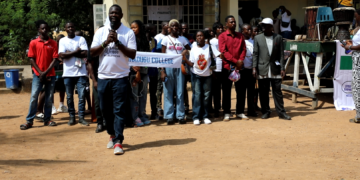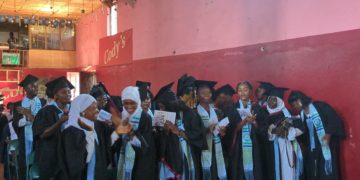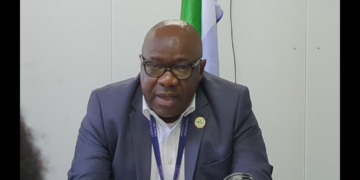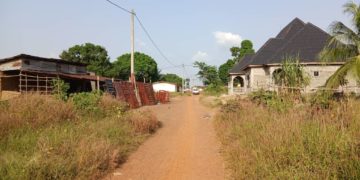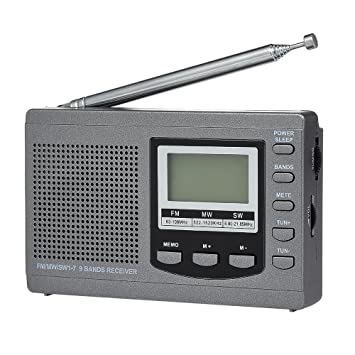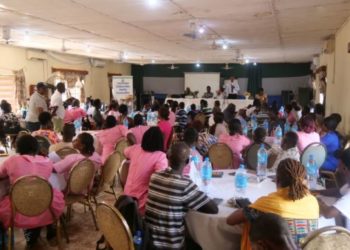The role of the media in Pujehun is the subject of a heated debate as media practitioners complain an increasingly hostile environment.
Unlike the western region and other districts in the south that have plethora of media platforms, Pujehun only has four functional community radio stations to inform its 429,000 inhabitants, according to data from the 2021 Midterm Population and Housing Census.
Several people reached out to by Manoreporters said that they trust the various media in Pujehun in terms of information dissemination, but they were more concerned about lack of professionalism by the media practitioners for their alleged tendency to interfere into people’s private lives through various programmes based on gossip.
Emmanuel Hilton, Head of the United Muslim Association Primary School in Benga Village, Kpanga Chiefdom, is one of the people who listen to many radio programmes. But he believes that the media in the district has a lot of room for improvement, especially with capacity building and support to run the stations to minimize “bad journalism.”
“Sometimes they don’t even investigate most of the things they put out. I think what they are interested in is who first report the story, without considering the damage it will cost. This is bad,” stressed Mr Hilton.
He added: “A clear example is the issue of fees subsidy. No sooner they hear that the government has paid fees subsidy, you will hear them reading figures that are not even correct. They will not come to you and ask. They will just go ahead and smear your image. This is creating a kind of bad relationship between school leaders and community people.”
However, not everyone is displeased with the media. Batu Senesie, a trader in Gbondapi, a trading community in Karbonde Chiefdom, was extremely impressed with the work of community radios in the district. She cited radios like Malen, Wanjei and Voice of Wanjama for broadcasting interesting and quality programmes such as News Update and Le Wi Know, as programmes that educate them a lot on daily happenings in Sierra Leone.
“These radios are really helping us to know about our country particularly during electioneering period. It is through them that we will hear all of the election results and they also entertain us a lot. So for me the radio stations are doing extremely well and I think they need to be supported,” she said.
But local authorities in the district also believe that it is still a long way to go for Pujehun to catch up with the rest of the country, due to the capacity challenges of those running media institutions.
One of the stakeholders who hold this view is Paramount Chief Samuel Saffa Ansumana Gbonda of Kpanga Krim Chiefdom. The 95-year-old Chairman of Council of Paramount Chiefs in Pujehun said such trainings must be continuous.
“Media practitioners require continuous training opportunities to boost up their media ethics and professional knowledge so that they will be able to practice responsible journalism,” PC Gbonda told Manoreporters in an interview at his Gobaru resident.
“But I think Pujehun is not getting much of these opportunities and so those government institutions charged with the mandate to provide such supports need to come in and help. This will help them grow and prevent trouble occurring between members of the public and journalists,” he added.
Radio Wanjei is the oldest community radio in the district. It came into existence in the early 2000 and has been known for its good governance programmes.
The station, according to its Production Manager Mohamed Kayimba, has on a number of occasions come under attack from members of the public and politicians in an attempt to prevent them from holding the government and its agencies to account.
“Sometimes you will just see people storm the radio and even your home when they hear certain programmes they think are not in their favour. There are times we get so scared for our lives because even though we think we are doing the right thing, working in line with the IMC code of practice, you still keep having trouble with people. It is very frustrating, and this is greatly affecting journalism in Pujehun,” Mr Kayimba lamented.
Responding to claims that they do not investigate most of the stories they broadcast on their medium and that they are always intruding into people’s personal lives, Kayimba said that has never happened.
“If the people who are saying this have evidence, they should bring it forward. But I know these are things they say to frustrate our efforts. As for me, I don’t pay much attention to such unfounded allegations,” he said.
Pujehun has one of the least investment opportunities in Sierra Leone. There are not many businesses and organizations operating in the district, despite many of its indigenes having major appointments in successive governments. Most of the radio stations are not getting support to run their affairs and Kayimba believes this is negatively impacting the media. He expressed fear that it may hinder the progress of independence journalism in the district.
After the end of Sierra Leone’s decade long civil conflict in 2002, the government instituted the Truth and Reconciliation Commission in 2004 to document human rights violations that were committed by the various warring factions. Even though the TRC recognized the important role the media played towards bringing the war to an end, it also noted that the media, especially radio stations, were used as propaganda machines by government, thus fueling the conflict.
Rights defenders see journalism as an important component of national development but, said Julius George Kamara, District Secretary of the Civil Society Forum, there is also the concern over its ability to make and unmake a society if not handled with care.
Kamara said as civil society they are aware of issues of grievances certain political actors in the district had with community radio stations during the last elections, which he thinks weren’t good for the peace and tranquility of the district.
He recommends training and engagements with district stakeholders ahead of this year’s elections, where media owners, workers, politicians and members of the public will sit together to discuss issues surrounding the media with the goal of developing the district.


